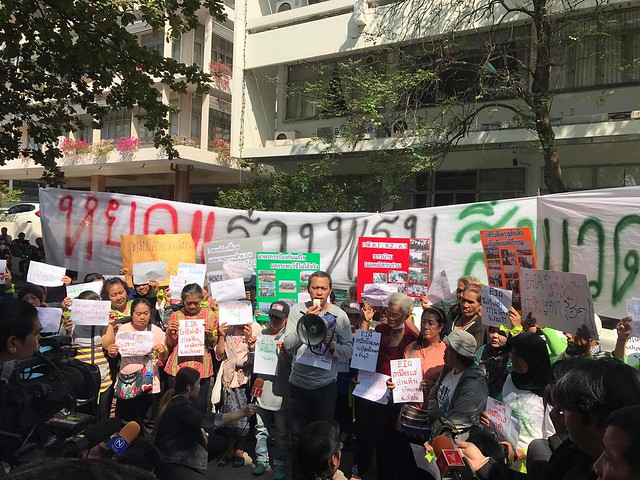
An official statement calling for the cancellation of the new environmental bill which does not reform EIA/EHIA.Throughout the eight months of drafting the Enhancement the and Conservation of National Environmental Quality Act, the Ministry of Natural Resources and Environment was supposed to be the agency responsible for amending the Act to reform the process of conducting Environmental Impact Assessments (EIA) and Environmental Health Impact Assessments (EHIA) in accordance with Article 58 of the Constitution and government policies in order to improve the country and create harmony between different parties in Thai society.Yet in practice the Ministry did not do this. The Ministry skewed the process by dusting off the Environmental Act used before the Constitution and rushed to process it within 240 days under Article 278 of the Constitution, without listening to the citizens’ views. The Ministry focused on reform of the EIA/EHIA system, a point of violent contention among people that causes financial, social, environmental and livelihood damage to citizens when it is carried out nationwide on development projects such as industrial plants, mines and high-rise buildings such as condominiums and large hotels.The draft Environment Act does not contain reforms that will lead to building and developing innovations to determine environmental impact reports. For example, the bill does not have regulations about Strategic Environmental Assessments (SEA) (even though this topic was stated by the junta leader on Feb. 21, 2016). On the other hand, the act contains a regressive loophole that waives the need for an EIA, rushing and cutting short the process. The bill even gives the cabinet the power to approve contracting of private companies to start work while waiting for EIA results, which is against globally-accepted environmental governance principles.The People’s Network for Sustainable Development would like to thank all of our brothers and sisters for supporting us in this fight. We would like to ask society to help pressure the junta to scrap this bill and reform the environmental law so that we may see a just decision-making process, protection of the environment and natural resources, and respect for the rights of citizens that are truly affected.The People’s Network for Sustainable DevelopmentDec. 7, 2017. Government House

Since 2007, Prachatai English has been covering underreported issues in Thailand, especially about democratization and human rights, despite the risk and pressure from the law and the authorities. However, with only 2 full-time reporters and increasing annual operating costs, keeping our work going is a challenge. Your support will ensure we stay a professional media source and be able to expand our team to meet the challenges and deliver timely and in-depth reporting.
• Simple steps to support Prachatai English
1. Bank transfer to account “โครงการหนังสือพิมพ์อินเทอร์เน็ต ประชาไท” or “Prachatai Online Newspaper” 091-0-21689-4, Krungthai Bank
2. Or, Transfer money via Paypal, to e-mail address: [email protected], please leave a comment on the transaction as “For Prachatai English”
